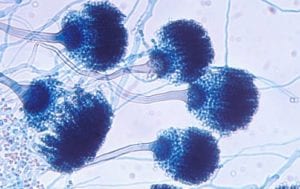
by Pigeon Patrol | Feb 26, 2020 | 4-S Gel Bird repellent, Animal Deterrent Products, Bird Deterrent Products, Bird Netting, Bird Spike, Bird Spikes, Pigeon Control, Pigeon Droppings, Pigeon Patrol's Services, Pigeon Spikes, Pigeons in the News, UltraSonic Bird Control
A new virus has been isolated from the tissues of pigeons with visceral lesions that were characterized by focal necrosis of parenchymatous tissue, by the presence in affected cells of

intranuclear inclusions of the herpetic type, and by secondary inflammatory reaction. This newly recognized virus, which has been tentatively called the I.N.I. agent is pathogenic for pigeons and embryonated eggs but is avirulent for rabbits, guinea pigs, and mice. The virus is smaller than the agent of psittacosis and is immunologically different from it. The I.N.I. agent and psittacosis virus were both of etiological importance in an epizootic among pigeons. Some birds were infected simultaneously with the two agents while others were infected with only one.
Source
At Pigeon Patrol, we manufacture and offer a variety of bird deterrents, ranging from Ultra-flex Bird Spikes with UV protection, Bird Netting, 4-S Gel and the best Ultrasonic and audible sound devices on the market today.
Contact us at 1- 877– 4– NO-BIRD, (604) 585-9279 or visit our website at www.pigeonpatrol.ca
Bird Gone, Pigeon Gone, Seagull Gone, Pigeon issue, pigeon spikes, 1-877-4NO-BIRD, 4-S Gel, Bird Control, Pigeon Control, bird repellent, Bird Spikes, sonic bird repellent, stainless steel bird spikes, bird spikes Vancouver, Ultra Sonic Bird Control, Bird Netting, Plastic Bird Spikes, Canada bird spike deterrents, Pigeon Pests, B Gone Pigeon, Pigeon Patrol, pest controller, pest control operator, pest control technician, Pigeon Control Products, humane pigeon spikes, pigeon deterrents, pigeon traps, Pigeon repellents, Sound & Laser Deterrents, wildlife control, raccoon, skunk, squirrel deterrent, De-Fence Spikes, Dragons Den, Canada bird spikes, Canada pigeon, pigeon control, pigeon patrol, pigeon. Kill pigeons, crow, starling
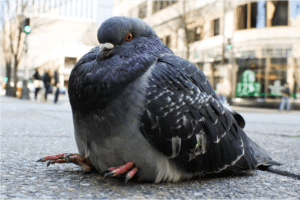
by Pigeon Patrol | Feb 26, 2020 | Animal Deterrent Products, Bird Deterrent Products, Bird Netting, Pigeon Control, Pigeon Droppings, Pigeon Patrol's Services, Pigeon Spikes, Pigeons in the News, UltraSonic Bird Control
I saw a fat pigeon the other day. There it was, doddering about on a Bowery doorstep, looking all smug and content. The fat pigeon had a fat pigeon ass and a fat pigeon belly that spanned the width of two normal birds, and I tried to imagine how the fat pigeon got to be so big. I pictured the fat pigeon tearing into a Big Mac, tufts of all-beef patty and sesame bun flying into the air with every peck, until the fat pigeon’s face was smeared with special sauce. I imagined the fat pigeon annihilating a holster of spilled French fries, and to be honest the thought of it got me pissed. Fries are for people, not pigeons. I stared at the fat pigeon long and hard, and the fat pigeon stared at me.
I’m not the only one who’s been seeing fat pigeons. In 2007, fat pigeons swarmed into Liverpool, England, pecking and pooping and plodding about, and so upset the locals that the City Council brought in 10 robotic peregrine falcons to scare off the zaftig varmints. A high-fat, garbage-based junk food diet had given the pigeons “a scruffy, unhealthy appearance,” explained one city official. Everyone agreed the fat pigeons had to go.
Of course, fat pigeons may be only the beginning. If one embarks on a tour of animal corpulence, spiraling out from captivity to the wild, a seemingly growing army of rotund beasts rounds into view. At home the fat animals are well known: They are fat husbands and fat children, fat dogs, fat cats, and fat pet macaws. Zoos and aquariums keep their own set of fat creatures in captivity. In 2008, for example, the dolphins at Japan’s Kinosaki Marine World grew too plump to jump, and were placed on a reduced-mackerel diet. A similar difficulty arose in a Shanghai aquarium when the sharks got so tubby that keepers gave them fish stuffed with cabbage to help them slim down.
Out in the country, some free-range fatties have sauntered onto the scene. Horse obesity is a growing concern on farms. In Arizona, wild burros have ballooned into genuine fat asses thanks to carrot-proffering tourists. The Lake Tahoe area’s garbage-eating black bears are unusually paunchy. And then there are the rats. Are the rats fat? One scientific study in 2010 found that feral rats collected near Baltimore had grown heavier over time. According to conventional wisdom, “wild” animals do not get fat. But is that truism breaking down for the commensal animals—like pizza-scarfing squirrels—that live in and around our fat- and sugar-laden “toxic” food environment? Has the obesity epidemic escaped from captivity? Is the Age of Fat Pigeons nigh?
Obesity researcher David Allison was on the team that identified the chunky urban rats. He and his colleagues also found signs of weight gain among captive populations of macaques, chimpanzees, vervets, marmosets, dogs, cats, and mice. For their study of vermin in the field, they reanalyzed weight data from rats captured in Baltimore alleyways as well as from rural rats trapped on parklands and farms between 1948 and 2006. The city rats had porked up more than the country rats, but both groups had probably needed to widen their burrows. I interviewed other rat experts who agreed that city rats tend to be huskier than their wild siblings, which subsist on bugs, slugs, acorns, and one another instead of half-eaten bagels and chicken wings. (Laboratory rats, with no room to exercise and all-you-can-eat feeding schedules, are bigger still.)
Allison says he doesn’t know why Baltimore’s rats have grown so large. (He doesn’t know for sure they have gotten fatter, as opposed to bigger overall, since his study only looked at weight.) It could be the result of the well-documented increase in food garbage, the selective killing of small rats by predators such as cats, changes in light exposure, improvements in rat health (perhaps facilitated by the food supply), or some environmental toxin that is disrupting the rats’ hormonal systems. Increasing temperatures might be another cause of rodent corpulence. A rat that spends less time shivering in the cold expends less energy. Scientists in Colorado report that shorter winters have given yellow-bellied marmots more time to forage and fill up their yellow bellies. (Climate change can work in the other direction, too: Sheep in the Scottish isles are thought to be getting smaller in the heat.) What about pigeons? Did Allison think the Age of Fat Pigeons was upon us? “[I]t would not at all surprise me if pigeons are more obese or fat than they used to be,” he said.
Different animals respond to calorie surpluses in different ways. Some species experience what biologists call “indeterminate growth” until late in their lives: As the animal takes in more food, it just gets bigger and bigger rather than storing excess calories as fat. Indeterminate growth is common among invertebrates such as earthworms and silverfish, but some mammals do it, too. A study from last year on crop-raiding African elephants showed that the well-nourished bulls got taller and longer and stronger and heavier than their pachyderm peers. All that extra food turned into pure tusker beefcake.
Humans, of course, stop growing in adulthood, so excess calories are converted to love handles under the right conditions. Baboons are the same way. Duke biologist Susan Alberts studied a group that lived near a tourist lodge in Kenya, and got most of its food by plundering a garbage dump instead of wandering the African plains. Not only did some of the animals get flabby as a result, she says, but they got dental cavities, too, and developed the sorts of insulin and cholesterol problems you’d see in a human case of metabolic syndrome. The scientists determined that the baboons weren’t getting sick from excess food—they took in the same number of calories as their wild-roaming brethren, despite a diet of discarded cake and pineapples—but rather they suffered from a lack of exercise. They did start having tons of healthy babies, though; increased fertility is the typical biological response to a surplus of food. The fat baboons are no longer being closely monitored, because the area where they hang out is patrolled by too many cantankerous wild buffaloes.
What did Alberts have to say about my fat pigeon? Did she think the global population of fat animals had reached an all-time high? She wasn’t sure. “If you went back to Egypt 5,000 years ago where they had lots of grain stored in granaries you can bet they had fat cats and fat mice and fat dogs.” But, she noted, “[W]herever there is excess human food, and humans have commensals, those commensals are going to be able to get fat.”
It might seem that birds shouldn’t get fat because they have to fly, but that is not the case. Many migratory birds get supremely blubbery in the days leading up to their big trip—some to 70 percent body fat. Adipose tissue weighs less than muscle, but it carries more energy, making it an essential resource for a long-distance flight. Pigeons don’t migrate, though, and despite their seasonal weight gain, birds tend not to be among the world’s top fatties. Research by the British zoologist Caroline Pond, author of The Fats of Life, suggests that human beings are among the bigger lard-asses in the animal kingdom, neck in neck with notable porkers like the hedgehog, the polar bear and the great whales, the fattest of God’s creatures. (The whole point of whaling was to get at their lipids.) In general carnivores tend to be more prone to growing chubby, as fatness is an adaptation to an unpredictable food supply.
Pond may be the world’s leading scholar of fat animals. Beginning in the early 1980s, she began riding her bike around the woodlands near her U.K. home at night collecting all the road kill she could carry: hedgehogs, badgers, foxes, whatever turned up stiff. Zookeepers and farmers gave her corpses, too—camels, monkeys, brown bears, whales—and soon she had dissected more than 250 mammals. Her interest was the comparative distribution of adipose tissue, a topic most life scientists at the time were too dignified to tackle. In mammals fat depots surround most organs, but textbooks often showed them with the fat removed, as if it were not part of the biological picture. What did Pond think about my fat-pigeon investigation? How was she preparing for the Age of Fat Pigeons? Well, she didn’t really think pigeons got fat.
Pigeon experts agree. Courtney Humphries, author of the book Superdove: How the Pigeon Took Manhattan … and the World, said she hadn’t heard of a pigeon obesity epidemic. Daniel Sol, a pigeon researcher in Spain, brought my fat pigeon flight of fancy crashing to Earth in an email: “Even in captivity, where food is not limiting, feral pigeons do not tend to get fat.” He said Montreal pigeons are bigger than Barcelona pigeons, even though Montreal pigeons have less food. He guessed the difference was due to the Canadian cold. Karen Purcell with Cornell’s Project PigeonWatch suggested the fat pigeon I saw might have been fluffing out its feathers because it was chilly. Urban bird expert John Marzluff wondered if the fat pigeon I saw might have been a dominant male—a big stud. He did allow that my vision of the fat pigeon eating a Big Mac was not crazy, based on his work in crows. “Oh, they love Big Macs, French fries and Cheetos and hot dogs. Corn dogs are especially a favorite.” But urban birds don’t seem to get fat. Too many hawks and other birds to worry about. As the animal philosopher Rikki-Tikki-Tavi once observed, “a full meal makes a slow mongoose.”
So my fat pigeon was a phantom. The obesity epidemic had not escaped captivity—it had colonized my mind. And if I ever see that pigeon again, I know what I will say: It was wrong of me to call you fat.
Source
At Pigeon Patrol, we manufacture and offer a variety of bird deterrents, ranging from Ultra-flex Bird Spikes with UV protection, Bird Netting, 4-S Gel and the best Ultrasonic and audible sound devices on the market today.
Contact us at 1- 877– 4– NO-BIRD, (604) 585-9279 or visit our website at www.pigeonpatrol.ca
Bird Gone, Pigeon Gone, Seagull Gone, Pigeon issue, pigeon spikes, 1-877-4NO-BIRD, 4-S Gel, Bird Control, Pigeon Control, bird repellent, Bird Spikes, sonic bird repellent, stainless steel bird spikes, bird spikes Vancouver, Ultra Sonic Bird Control, Bird Netting, Plastic Bird Spikes, Canada bird spike deterrents, Pigeon Pests, B Gone Pigeon, Pigeon Patrol, pest controller, pest control operator, pest control technician, Pigeon Control Products, humane pigeon spikes, pigeon deterrents, pigeon traps, Pigeon repellents, Sound & Laser Deterrents, wildlife control, raccoon, skunk, squirrel deterrent, De-Fence Spikes, Dragons Den, Canada bird spikes, Canada pigeon, pigeon control, pigeon patrol, pigeon. Kill pigeons, crow, starling
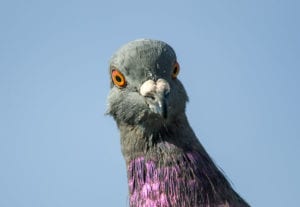
by Pigeon Patrol | Feb 26, 2020 | 4-S Gel Bird repellent, Animal Deterrent Products, Bird Spike, Pigeon Control, Pigeon Droppings, Pigeons in the News, UltraSonic Bird Control
Zombie pigeon epidemic sparks fears of transmission to humans
An “epidemic” of pigeon deaths in Moscow has sparked speculation that birds were succumbing to a virus dangerous to human beings. People who came across sick birds paying no attention to cars or passersby described them as “zombie pigeons.”
On Wednesday the Federal Veterinary and Phytosanitary Inspection Service reported that the birds’ abnormal behavior was caused by the so-called “Newcastle disease,” which can spread to humans.
Moscow’s Veterinary Committee said the mass death of pigeons in the capital was due to salmonellа poisoning, an intestinal infection spread among animals and humans. Veterinary specialists detected lesions on the gastrointestinal tracts and livers of the dead birds caused by salmonella, not Newcastle disease, Interfax reported.
Autopsies of dead birds showed that they had all suffered from a common intestinal infection that is not dangerous to humans, said Moscow’s deputy mayor for social issues, Leonid Pechatnikov. Neither the bird flu, dangerous to humans, nor fowl plague or any other diseases threatening people have been found, he said.
Gennady Onishchenko, Russia’s chief sanitary inspector, said that while the word “pigeon epidemic” was often used in the press, he doubted it could described as one. However, he warned that parents should take care if their children could come into contact with sick birds.

“We are especially worried about children’s playgrounds… And if a dead bird is found on the balcony, it must be washed with disinfectant. Doing this, one must be wearing rubber gloves,” Onishchenko said.
Although the birds’ salmonella is not harmful to humans, direct contact with the sick birds should be avoided, veterinarians said.
“The disease poses no risk for humans, provided standard precautions of personal hygiene are observed and direct contact with sick birds is avoided. Activators of avian influenza and psittacosis (an infection that can be transmitted to humans) have not been identified,” the committee said.
Salmonella infections in humans usually resolve in 5-7 days, but a small number of persons with Salmonella develop pain in their joints, irritation of the eyes and painful urination. The so-called Reiter’s syndrome can last for months or years, and can lead to chronic arthritis.
Newcastle disease, which is transmissible to humans, can cause mild conjunctivitis and influenza-like symptoms.
Ornithologists say that the so-called “epidemic” occurs every year, and not only in Moscow. “Most often, it begins in August. This is due to the fact that the breeding season is over, young birds come out with reduced immunity, and they are more susceptible to all infectious diseases,” ornithologist Natalia Anisimova told Russia’s TV Dozhd (Rain).
source
At Pigeon Patrol, we manufacture and offer a variety of bird deterrents, ranging from Ultra-flex Bird Spikes with UV protection, Bird Netting, 4-S Gel and the best Ultrasonic and audible sound devices on the market today.
Contact us at 1- 877– 4– NO-BIRD, (604) 585-9279 or visit our website at www.pigeonpatrol.ca
Bird Gone, Pigeon Gone, Seagull Gone, Pigeon issue, pigeon spikes, 1-877-4NO-BIRD, 4-S Gel, Bird Control, Pigeon Control, bird repellent, Bird Spikes, sonic bird repellent, stainless steel bird spikes, bird spikes Vancouver, Ultra Sonic Bird Control, Bird Netting, Plastic Bird Spikes, Canada bird spike deterrents, Pigeon Pests, B Gone Pigeon, Pigeon Patrol, pest controller, pest control operator, pest control technician, Pigeon Control Products, humane pigeon spikes, pigeon deterrents, pigeon traps, Pigeon repellents, Sound & Laser Deterrents, wildlife control, raccoon, skunk, squirrel deterrent, De-Fence Spikes, Dragons Den, Canada bird spikes, Canada pigeon, pigeon control, pigeon patrol, pigeon. Kill pigeons, crow, starling
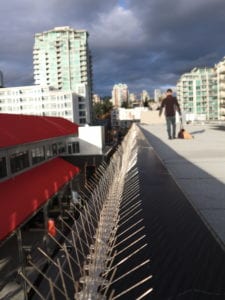
by Pigeon Patrol | Feb 16, 2020 | Animal Deterrent Products, Bird Spike, Pigeon Control, Pigeon Droppings, Pigeon Spikes, UltraSonic Bird Control
Controlling Pigeon Nuisance
The common pigeon (Columba livia) that thrives throughout Missouri and most other states was developed from the European rock dove and introduced into this country as a domesticated bird. When these birds escaped captivity, they formed feral populations. Today, the pigeon is a nuisance and probably the most serious bird pest associated with human habitations.
Pigeons are commonly found around farmyards, grain elevators, feed mills, parks, city buildings, bridges and other areas that provide roosting, loafing and nesting sites. They are also a common sight around home bird feeders.
Problems caused by pigeons
Nuisance pigeon droppings on park benches, cars and buildings are not only unsightly and smelly but also corrosive, particularly to buildings. Large amounts of droppings also can kill vegetation.
Around farms, grain elevators and feed mills, pigeons consume and contaminate large quantities of grain.
Pigeons have been implicated in the transmission of diseases such as pigeon ornithosis, encephalitis and salmonella food poisoning. However, the actual incidence of transmission of diseases from pigeons to people is difficult to assess. Disease outbreaks that are directly attributed to pigeon flocks are rare.
Pigeon manure, if allowed to accumulate for several years, can harbor the causal agent of histoplasmosis, a systemic fungus disease that affects the human respiratory tract. In severe cases, histoplasmosis can be fatal. The external parasites of pigeons include various species of mites, fleas, ticks and bugs.
In addition to being a threat to human health, pigeons can be a threat to human safety, particularly around airports, where pigeon flocks have collided with aircraft, causing human fatalities.
To find out more
At Pigeon Patrol, we manufacture and offer a variety of bird deterrents, ranging from Ultra-flex Bird Spikes with UV protection, Bird Netting, 4-S Gel and the best Ultrasonic and audible sound

devices on the market today.
Contact us at 1- 877– 4– NO-BIRD, (604) 585-9279 or visit our website at www.pigeonpatrol.ca
Bird Gone, Pigeon Gone, Seagull Gone, Pigeon issue, pigeon spikes, 1-877-4NO-BIRD, 4-S Gel, Bird Control, Pigeon Control, bird repellent, Bird Spikes, sonic bird repellent, stainless steel bird spikes, bird spikes Vancouver, Ultra Sonic Bird Control, Bird Netting, Plastic Bird Spikes, Canada bird spike deterrents, Pigeon Pests, B Gone Pigeon, Pigeon Patrol, pest controller, pest control operator, pest control technician, Pigeon Control Products, humane pigeon spikes, pigeon deterrents, pigeon traps, Pigeon repellents, Sound & Laser Deterrents, wildlife control, raccoon, skunk, squirrel deterrent, De-Fence Spikes, Dragons Den, Canada bird spikes, Canada pigeon, pigeon control, pigeon patrol, pigeon. Kill pigeons, crow, starling
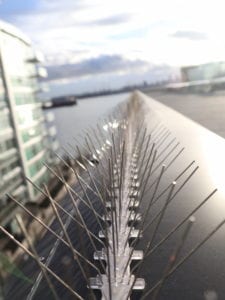
by Pigeon Patrol | Feb 16, 2020 | Bird Deterrent Products, Bird Netting, Bird Spikes, Pigeon Control, Pigeon Droppings, Pigeon Patrol's Services, Pigeon Spikes, UltraSonic Bird Control
How to get rid of pigeons?
How to get rid of pigeons? The Council has no policy to control or cull birds within the area.
It is generally acknowledged that reducing the population by culling can only have a short-term effect, and populations soon recover.
Food is the most important factor determining the size of any pigeon population, and the best known, long-term solution to pigeon problems is to restrict its availability.
Numbers can also be reduced by restricting roosting and nesting spaces. Replacing broken roof tiles and closing open/broken windows will stop pigeons gaining access to buildings. Specialist contractors use fine mist nets and small spikes placed on windows to discourage pigeons from roosting on buildings.
Specialist contractors can be employed to carry out appropriate action. Darlington Borough Council does not provide this service or any financial assistance to carry out the work.
What the law says about pigeons
Most birds and their nests are protected under the Wildlife and Countryside Act 1981.
The Act allows for the control of certain birds, including feral pigeons, by authorised persons using specified methods to prevent serious damage to agriculture, to preserve public health / air safety, or to conserve other wild birds.
The use of spring traps, poisons, certain types of nets, gassing and sticky substances that may entangle a bird are illegal. Approved methods include trapping or drugging followed by humane destruction and shooting.
It is an offence under the Criminal Damage Act 1971 to intentionally kill a racing pigeon.
Source

At Pigeon Patrol, we manufacture and offer a variety of bird deterrents, ranging from Ultra-flex Bird Spikes with UV protection, Bird Netting, 4-S Gel and the best Ultrasonic and audible sound devices on the market today to get rid of pigeons.
Contact us at 1- 877– 4– NO-BIRD, (604) 585-9279 or visit our website at www.pigeonpatrol.ca
Bird Gone, Pigeon Gone, Seagull Gone, Pigeon issue, pigeon spikes, 1-877-4NO-BIRD, 4-S Gel, Bird Control, Pigeon Control, bird repellent, Bird Spikes, sonic bird repellent, stainless steel bird spikes, bird spikes Vancouver, Ultra Sonic Bird Control, Bird Netting, Plastic Bird Spikes, Canada bird spike deterrents, Pigeon Pests, B Gone Pigeon, Pigeon Patrol, pest controller, pest control operator, pest control technician, Pigeon Control Products, humane pigeon spikes, pigeon deterrents, pigeon traps, Pigeon repellents, Sound & Laser Deterrents, wildlife control, raccoon, skunk, squirrel deterrent, De-Fence Spikes, Dragons Den, Canada bird spikes, Canada pigeon, pigeon control, pigeon patrol, pigeon. Kill pigeons, crow, starling

by Pigeon Patrol | Feb 16, 2020 | Bird Deterrent Products, Bird Netting, Bird Spikes, Pigeon Control, Pigeon Droppings, Pigeon Spikes, UltraSonic Bird Control
Do pigeons do any harm? – pigeons dropping are not only unsightly but are acidic and in large quantities can cause damage to buildings and machinery. Nesting material, droppings and feathers can also block gutters and air vents.
Public health – pigeons can carry diseases, some of which may do harm to people, for example if droppings contaminate food stuffs. As such their presence cannot be tolerated in and around food premises. They also carry mites which can cause skin disease and dust from their feathers can cause respiratory problems in confined spaces.
Accidents – pigeon droppings and food left down for pigeons can cause walkways and fire escapes on buildings to become slippery and dangerous. Startled flocks can take flight suddenly, causing hazards to motorists and pedestrians.
Other birds – large numbers of pigeons can force smaller birds away from feeding areas. The pigeons also spread disease to other birds, reducing their numbers.
Source
At Pigeon Patrol, we manufacture and offer a variety of bird deterrents, ranging from Ultra-flex Bird Spikes with UV protection, Bird Netting, 4-S Gel and the best Ultrasonic and audible sound devices on the market today.
Contact us at 1- 877– 4– NO-BIRD, (604) 585-9279 or visit our website at www.pigeonpatrol.ca
Bird Gone, Pigeon Gone, Seagull Gone, Pigeon issue, pigeon spikes, 1-877-4NO-BIRD, 4-S Gel, Bird Control, Pigeon Control, bird repellent, Bird Spikes, sonic bird repellent, stainless steel bird spikes, bird spikes Vancouver, Ultra Sonic Bird Control, Bird Netting, Plastic Bird Spikes, Canada bird spike deterrents, Pigeon Pests, B Gone Pigeon, Pigeon Patrol, pest controller, pest control operator, pest control technician, Pigeon Control Products, humane pigeon spikes, pigeon deterrents, pigeon traps, Pigeon repellents, Sound & Laser Deterrents, wildlife control, raccoon, skunk, squirrel deterrent, De-Fence Spikes, Dragons Den, Canada bird spikes, Canada pigeon, pigeon control, pigeon patrol, pigeon. Kill pigeons, crow, starling







